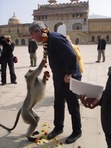Colin W. Sargent's Blog: Divagations, page 3
March 26, 2016
The Almost Corner

There's a lively buzz at The Almost Corner Bookshop, a magical place with a magical name on Via del Moro, 45, 00153 Roma, Italy. Run by Irish ex-pat Dermot O'Connell and his manager and events coordinator Anita Ross, from Scotland, this destination is a legendary stop for readers and writers. The collection is exciting and daring, the clientele witty and charming (including an opera expert; a chef who cooks for a billionaire with homes in Rome and Newport, Rhode Island; a couple who'd just sold everything and dared to start a new life in Rome; bookstore habitués; and a surprise visit from two vagabonds from Chicago, my son and daughter in law). I"ll never forget this reading.
That night, we dine at the Royal Art Cafe, No. 1 Piazza del Colosseo, with views of the Colosseum. A swank tourist trap, it's open till 2 a.m.. At least twenty metropolitan swells (both women and men) in their early twenties–dressed as if they're escorts in an Italian version of Breakfast at Tiffany's–wait on the sidewalk. Will a UFO slide in and pick them up? They seem barely interested in each other. The Lonely Crowd.

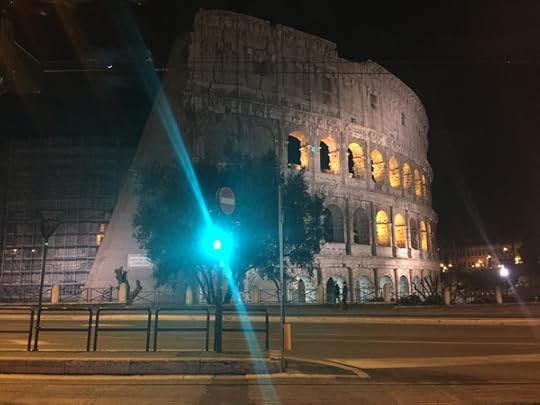
Next, we drive (watch out, Italy) south along the coast to Naples, where we stay at Hotel Grand Parkers, with its sweeping city views of the Bay of Naples, Vesuvius, Sorrento, and Capri, which looks like the head of a crocodile on the horizon. One of the first things we do is give a copy of the novel to the concierge, Marco, who has skills rivaling Raffi's. We'd met him in April while I was researching and writing the story.
The following day, we head to the U.S. Navy Base in Naples for a reading at the striking modern library and an interview on Armed Forces Radio Network. When I answer questions about the novel into the microphone, I feel my father listening from decades away. As a B-17 pilot, he flew 35 missions over Germany and Occupied France during World War II. Armed Forces Radio Network had just hit the airwaves in 1943. The Allied network faced stiff competition: Lord Haw-Haw and Axis Sally.
The Naples Navy library is run by Ciro Giordano, who also set up the radio interview. I mention to him that when I spoke with Dr. Helen Hills in York, England, she told me she used to tune in AFN during her visits to Naples when she craved hearing English. It's a big signal, and a lot of people have been swept up in it.
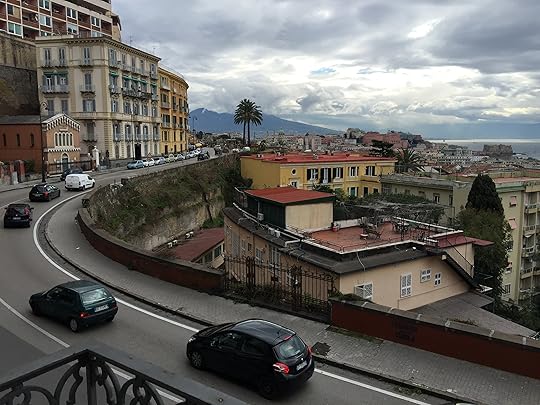
I listened to it when I was a Naval Officer, detached in Naples in the early 1980s. My wife Nancy, a future Navy dentist, and her family heard it, too, when she was growing up here. At separate times but in separate decades, both she and I were billeted at the same two places, Hotel Forum in Rome and Grand Hotel Parkers in Naples.
Published on March 26, 2016 13:47
March 20, 2016
Speak of the Devil

It's amazing how Rome celebrates its ruins.
I'm in Hotel Forum, where Raffi's bar really exists and where I have a reading of the Rome chapter of the novel.
Outside, the white marble columns of the decaying Roman Forum jump out of the darkness beside the silhouettes of palm trees. Traffic lights flash around the Colosseum. This may really be the most exciting place on earth where 'then' slides so easily in and through our sense of 'now.'
The hotel staff has set up a reading of The Boston Castrato in the luxuriant lobby of the hotel, where the story has lain in wait for me. Raffi mixing martinis. The allupata Stefania.
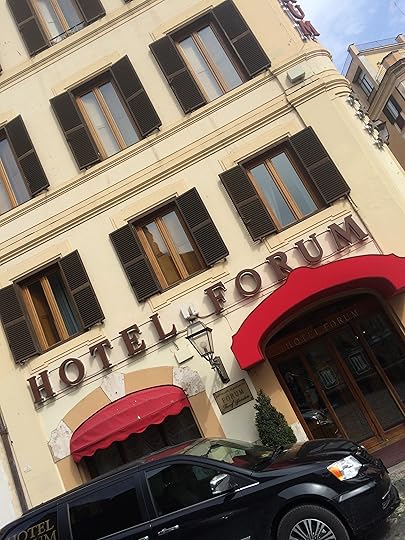
When I approach a banner of the novel's cover before the reading, the concierge comes over, motions me closer, and whispers, "Sir, did you know there is an Italian word castrato, too?" He's concerned for me and would like to save me from embarrassment. When I say yes, he says, "But...sir, do you know what it means, in Italian?" He looks to his left and his right. Then he shoots his left forearm in front of his waist and makes three quick cutting motions from left to right with his other hand--whisk, whisk, whisk.
But when he listens to the story, he understands the fable and it's all right. Interesting people have floated into the lobby to hear, including a woman at seminary school and a music executive who's worked with Judy Collins and Crosby, Stills, and Nash.
When it's over, I indulge in one of Raffi's magic martinis: "Ice cold gin, a whisper of vermouth, and a single, lusciously pendulous caper berry." I ask the bartender how long he's been at the Forum.
"Eleven years."
I start to speak, then stop. Finally I blurt it out. "There was a person who worked at the bar before you. It was about 18 years ago." In fact he looked like a pocket Rutger Hauer–a flash of lightning-blond hair standing up in a scary way. It was like Marlon Brando's disturbing blond hair in The Young Lions. "Do you know who he was, or have you ever heard someone speak of him?"
My wife and I were traveling with our dear friend Johanna, and back then we sensed something pass wordlessly between Johanna and this bartender of 'before."
"What was that?" I asked Johanna.
She smiled and looked down. "It's nothing. It's just...we're both Germans."
I asked a thousand follow-up questions, but she wasn't talking. Mysterious people seem so relaxed in their mysteries. Johanna died two years ago, of MS. We miss her terribly.
"I think he was German," I say to our 'new' bartender. "Have you ever heard of anyone like that?"
"There was no German here before me," he said. "No." He disappeared into a little side room to check out his inventory. Maybe it was where he kept the rarest vintages. I hadn't seen this little side door before. Five minutes later, he came back.
"Unless you're talking about Fausto," he said. "His nickname was Faustino."
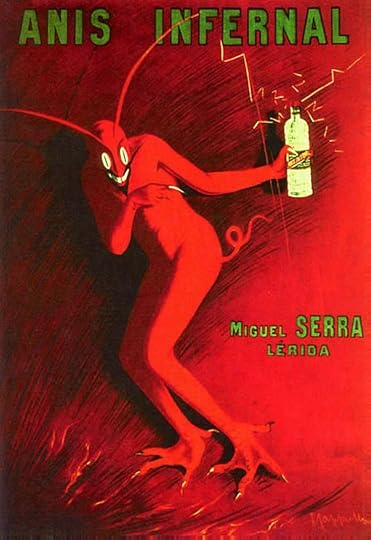
Published on March 20, 2016 13:30
March 16, 2016
Crossing the Alps into Spring

Flying from London to Rome means crossing the Alps. The Alps of Byron's Manfred, Mary Shelley's Frankenstein, Hemingway's A Farewell to Arms. Here's D.H. Lawrence describing them in Women In Love: "It was a silence and a sheer whiteness exhilarating to madness. But the perfect silence was most terrifying, isolating the soul, surrounding the heart with frozen air."
He wrote that from sea level! Then there's George Eliot's The Lifted Veil: "When I was sixteen I was sent to Geneva to complete my course of education; and the change was a very happy one to me, for the first sight of the Alps, with the setting sun on them, as we descended the Jura, seemed to me like an entrance into heaven; and the three years of my life there were spent in a perpetual sense of exaltation, as if from a draught of delicious wine, at the presence of Nature in all her awful loveliness."
From 40,000 feet, we descend gently toward the blue-green Meditarranean. It's shocking to see how close the icy Alps are to Rapallo far below us, already enjoying its spring. Next stop, Via Tor de' Conti, 25-30, Roma, Italy.

Published on March 16, 2016 12:32
March 14, 2016
Swing Through England

I love places where you can't guess what year you're walking into. So I love The Sun Hotel & Bar in Lancaster, near the edge of the Irish Sea. It's where I stayed the night before I defended my PhD at the University of Lancaster. Now, I'm staying in the same lucky room again, Room 16, before my publication reading at the University of Lancaster.
At the delicious Sun Cafe, I order "Black and Blue Mushrooms." It's mushrooms sautéed in olive oil with blue cheese and Lancaster Black stout. Online (where a luxury provisioner will whisk a bottle to the US for 28 pounds), I see the following: "Lancaster Black is a British stout for the connoisseur. Jet black in colour, it is a complex traditional dark brew with subtle hints of coffee and dark chocolate." Why the enthusiasm? Try the mushrooms and see. Then try the incredible fish and chips (cod).
The reading at Lancaster is a fantastic homecoming. It's a beautiful campus with 13,000 students. How great it is to see the talented Dr. George Green (I highly recommend his novels Hawk and Hound (about the Hound of Ulster).
Literary theorist Mikhail Bakhtin, author of The Dialogic Imagination, says that there's real time and "epic" or "great" time. For me, The Sun Hotel & Bar and Lancaster University exist in great time.
* * * * *
It's Pecha Kucha Night at the Huddersfield Literary Festival. They've asked me to take my 300-page story and present it in the Pecha Kucha style: 20 slides, 20 seconds. Oh, and the venue will serve alcohol while all of this is going on. Did we mention that fruit is encouraged to be thrown? Shades of the Globe Theatre. Gulp. But it's a blast. What's most surprising is, the captions themselves are a very visual way of presenting the story. The title of my Pecha Kucha piece, responding to Huddersfield's request that we honor the theme of ten (because it's the festival's 10th year) is:
10 Forms of Castration & the Devils Behind Them
(captions follow)
At a dinner party, a friend who died last year of M.S. but always kept her naughty sense of humor, even in paraplegia, rabbit punched me with, Must everything be a joke to you? in her usual Teutonic clip. Okay. I deal with uncomfortable subjects with lame humor. So it was time to write this novel I’d been pondering on sexual identification, gender & beauty issues, style, and death, The Boston Castrato.
Naples, Italy, 1906. You’re just six years old. Your mother dies. You’re left to fend for yourself. So what do you do? You sing at the train station for coins. Devil #1, a mad priest, snatches you with the lure of a full belly. And singing lessons.
He whispers he’ll make you a star in exchange for agreeing to the slightest of alterations. You won’t feel a thing. "Just one snip, and you will be asked to sing in the greatest basilicas and opera houses in the world. Your fans will shower you with gifts and praise. You’ll sound like an angel. Forever."
But nothing is forever. The devil takes many forms. The very Church that told you your voice is beautiful now deems it repulsive, embarrassing. Not good PR to brutalize children in the line of beauty. Speaking for the Vatican, a cardinal in red gives you the violent hook: "We're out of the monster business." We’re EXILING you to America. Out of sight, out of mind.
Because style is not forever. It’s the 20th century. There’s always a new sound, the next new thing.
Speaking of style, in the transgender 1920s, anything (as long it doesn’t have to do with your decision) goes. In a complete denunciation of the hourglass figure, suddenly every woman wants to look like a little boy. Flat chests, bowl cuts, angled elbows, and the new tanning (thanks, Coco Chanel)–are all the rage.
Landing in Boston, you’re unmanned and unmoored, working in a snooty hotel. And let’s get this straight, Mr. Latin Waiter. You’re in the serving class. As an immigrant, it’s hard to imagine anything but. If you’re not a six-foot white male Protestant, there isn’t much room at the table. But you can serve the table.
You meet a fellow sufferer, Victor. Born into one of Boston's wealthiest families, the supremely talented Victor is labeled a bastard and scorned by his boss (and half brother). He’s relegated to sleeping in the basement because (scandal alert) he’s mixed-race. And blind.
But wealth doesn't keep you safe. Fat-shaming is nothing new. Gifted poet Amy Lowell, heir to the Boston Brahmin Lowell family, is persecuted for her looks & sexual orientation and branded with the Scarlet L. She thought she’d found her tribe in the literati but is betrayed and humiliated by her ‘friends,’ including…
Ezra Pound, who took her money but skewered her at Dieudonne Hotel when she showed up in London with her lover, actress Ada Russell, to join the Imagists. She was dismissed as flaunting when she shipped over her maroon Pierce Arrow and booked an entire floor at the Berkeley Hotel. Nothing Kanye West wouldn’t do today. Newsmen piled on: “From left to right: Amy Lowell.”
All artists are made irrelevant by taste; self-doubt is more corrosive. You meet the painter John Singer Sargent, extremely popular until he was replaced by the Cubists. His painting Gassed is in the British War Museum. Talk about riding high in April, shot down in May. He didn’t live to see this new June, where he’s being recast as a red-hot early Modernist.
Another devil is the self-described tastemaker, the reviewer-critic Royal Cortissoz, who alternates between fawning and sniping. As a provocateur, he puts jealousy to pen and jabs at sensitive spots. Amy Lowell and John Singer Sargent are two of his targets.
But devils don't come in just one gender. Raffi's nemesis at the Parker House, Addison Saltonstall, has his own devil at home in the form of his beautiful but deadly-strong wife, who, sensing weakness in his character, takes delight in humiliating him. So on target is she that he participates.
Sexual predators catch you at your weakest and steal the last of your powers by posing as your “comforter and benefactor.” Gangster Frank Morelli guarantees he’s going to send luck (and a steady paycheck) to devastated Dorotea.
Marginalization by race and ethnicity destroys dreams. If you’re trapped with a label, you have a devil of a time getting out from under it. In the 1920s, Boston teems with new citizens from all over the world that lay bare old resentments. But that, of course, couldn’t ever happen today.
The Allure of Modernity in 1922–so illusory. Sun-tan machine: Melanoma for a nickel. The new canning technology will surely prevent any possibility of spoilage. When a child is born slightly ‘different,’ the kindly devil surgeon imperiously evokes Science when he flashes a scalpel to decide a child must be one of two genders. Period.
Mass Marketing explodes. Suddenly you’re hawked a solution for a problem you never knew you had. Raffi is offered a second chance at celebrity: He’s packaged as the quintessential Underwood Devil who answers your every social need in a family friendly form—because he has no package.
Bootleggers, politicians, and mobsters–all devils bent on beating New York in a race to build the first major East Coast airport. It’s easy to be smug in a new century when you don’t know what your mistakes are going to be. Raffi is witness to a murder and reconnects to a very old devil.
But this isn’t the end for Raffi. Gender is not in the genitals. Sexual orientation is not in the sex organs. The most significant erogenous zone is the mind. Can a clairvoyant castrato find love? Raffi discovers his way to sing a genuine love song.
In 1922, séances are the social medium. You can have 23,000 followers, and none of them has to be alive! The ultimate castration is, we’re out of time!
* * * * * * * *

I stop at the University of York for a cappuccino with Professor Helen Hills, organizer of the Neapolitan Network and the academic conference "Exoticizing Vesuvius." The "Neapolitan Network exists to connect scholars of Naples from around the world and across disciplines in order to facilitate lively intellectual exchange and research collaboration... The Neapolitan Network will continue to build up a database of Neapolitanist scholars and their scholarship."
I'm here because Vesuvius, with its puff of smoke above the curve of the Bay of Naples, looms in Raffi's psychic geography. It leans into windows to eavesdrop on him: "As long as he could remember, the slow blue slope had followed him–an attentive audience. It roamed with him through the city, into Virgil’s Tomb where he sold daguerreotypes to sightseers, down sooty alleys where the dustbins stood, rich with treasures, disappearing and reappearing at the end of sunlit squares to whisper, ‘I’ve got my eye on you.’"
* * * *
Next stop, the University of Hull, with a dream reading at the Philip Larkin Centre. I have admired Larkin's work since High Windows came out. This is a real honor in a gorgeous setting, and the moderator has read the novel and asks questions that are so insightful that the story lifts into the air and starts to swirl.
The next day, it's lunch at The George Hotel in Hull. Yorkshire Pudding and Shepherds' Pie. I learn a disturbing story, one to keep you up at night. During World War II, if a German plane hadn't used all its bombs over London, on the return flight it was directed to release what bombs were left over on Hull before crossing the Channel.
Published on March 14, 2016 10:36
March 9, 2016
Bedazzled in London


In the blink of the London Eye we catch sight of the HMS Belfast emblazoned with Dazzle Camouflage. Once classified top secret, Dazzle is what Ephraim Lowell performs with a brush in 1922 at Fore River Shipyard in Quincy, Massachusetts, as a member of the Camouflage Corps in The Boston Castrato. Beatrice tells Raffi she dreams of joining the Corps, too. The technique was developed to confuse enemy submarines about the speed and direction of a surface target.


Published on March 09, 2016 10:38
March 6, 2016
Breakfast at the Berkeley
The book tour begins!
Driving through London, we find ourselves suddenly in Paris. We've taken a lucky turn in traffic and are now driving slowly through a movie set for a Stanley Tucci film. There is Tucci, ducking traffic. He looks cold. Bicycles and pedestrians flash by from 1937. It's a vivid demonstration that fiction is the lie that tells the truth.
The first reading is at a bookshop on Notting Hill, Lutyens and Rubinstein. Among the books I sign is one for Sarah. She's the owner of the travel book store that is the star of the movie Notting Hill, with Hugh Grant and Julia Roberts.
I'm starstruck and London struck. When I wake the next morning, there's a review. http://www.morningstaronline.co.uk/a-...

By the way, I'm inviting you to breakfast. Here's the invitation, sent by Barbican Press:
Channeling Amy Lowell: Invitation to "Breakfast at the Berkeley"
Breakfast at the Berkeley, Berkeley Hotel, Wilton Pl, London, SW1X 7RL, 9 a.m. to 10:30 a.m., March 20. Breakfast with author Colin W. Sargent, author of The Boston Castrato (Barbican Press, 2016). Free, but an advance reservation is required. Please send request to portlandmagazine@hotmail.com with the subject line “Breakfast at the Berkeley.”
Amy Lowell and her coterie are at the heart of Colin W. Sargent’s recreation of 1922 Boston, The Boston Castrato. In 1913 Amy Lowell and the actress Ada Russell booked an entire floor at the Berkeley Hotel, and the stage was set for her encounters with the Imagist poets.
After decades of neglect, a timely awakening of appreciation of Amy Lowell’s talent is afoot. Though she was granted a posthumous Pulitzer in 1926 for What’s O’clock, she was ignored for nearly a century and dismissed, even occasionally by her own biographer. An informal tally of 1975’s Amy: The World of Amy Lowell and the Imagist Movement reveals she’s referred to as “fat” dozens, if not hundreds, of times in the text. Universally, there’s been an unexplored sense of how dare this rich little rich girl ever try to understand and interpret the world, especially if she’s earned the Scarlet F?
It is impossible to study the Imagists in the U.S. without studying Amy Lowell. Her role as an opposition character to Ezra Pound injected incredible energy to the Imagists. Locked in a death struggle with him forever, she is Pound’s Other. Her poems to Ada, so violently maligned, are some of the most touching words ever written.
Colin reads his recreation of Amy’s world, and discusses her London visit, its repercussions, and her place in the transgendered and nonfconformist world of his novel. For more, see www.colinwsargent.com.

For those in the North, Colin is in conversation about his novel at its launch for the Philip Larkin Centre for Poetry & Creative Writing, University of Hull, March 10th, 6.30 – Exhibition Room, Brynmor Jones Library. Free. m.j.goodman@hull.ac.uk for more information.
Driving through London, we find ourselves suddenly in Paris. We've taken a lucky turn in traffic and are now driving slowly through a movie set for a Stanley Tucci film. There is Tucci, ducking traffic. He looks cold. Bicycles and pedestrians flash by from 1937. It's a vivid demonstration that fiction is the lie that tells the truth.
The first reading is at a bookshop on Notting Hill, Lutyens and Rubinstein. Among the books I sign is one for Sarah. She's the owner of the travel book store that is the star of the movie Notting Hill, with Hugh Grant and Julia Roberts.
I'm starstruck and London struck. When I wake the next morning, there's a review. http://www.morningstaronline.co.uk/a-...

By the way, I'm inviting you to breakfast. Here's the invitation, sent by Barbican Press:
Channeling Amy Lowell: Invitation to "Breakfast at the Berkeley"
Breakfast at the Berkeley, Berkeley Hotel, Wilton Pl, London, SW1X 7RL, 9 a.m. to 10:30 a.m., March 20. Breakfast with author Colin W. Sargent, author of The Boston Castrato (Barbican Press, 2016). Free, but an advance reservation is required. Please send request to portlandmagazine@hotmail.com with the subject line “Breakfast at the Berkeley.”
Amy Lowell and her coterie are at the heart of Colin W. Sargent’s recreation of 1922 Boston, The Boston Castrato. In 1913 Amy Lowell and the actress Ada Russell booked an entire floor at the Berkeley Hotel, and the stage was set for her encounters with the Imagist poets.
After decades of neglect, a timely awakening of appreciation of Amy Lowell’s talent is afoot. Though she was granted a posthumous Pulitzer in 1926 for What’s O’clock, she was ignored for nearly a century and dismissed, even occasionally by her own biographer. An informal tally of 1975’s Amy: The World of Amy Lowell and the Imagist Movement reveals she’s referred to as “fat” dozens, if not hundreds, of times in the text. Universally, there’s been an unexplored sense of how dare this rich little rich girl ever try to understand and interpret the world, especially if she’s earned the Scarlet F?
It is impossible to study the Imagists in the U.S. without studying Amy Lowell. Her role as an opposition character to Ezra Pound injected incredible energy to the Imagists. Locked in a death struggle with him forever, she is Pound’s Other. Her poems to Ada, so violently maligned, are some of the most touching words ever written.
Colin reads his recreation of Amy’s world, and discusses her London visit, its repercussions, and her place in the transgendered and nonfconformist world of his novel. For more, see www.colinwsargent.com.

For those in the North, Colin is in conversation about his novel at its launch for the Philip Larkin Centre for Poetry & Creative Writing, University of Hull, March 10th, 6.30 – Exhibition Room, Brynmor Jones Library. Free. m.j.goodman@hull.ac.uk for more information.
Published on March 06, 2016 00:24
February 24, 2016
John Singer Sargent: Fashion Inspiration
Look who's the talk of Fashion Week. Portraitist John Singer Sargent, a character in The Boston Castrato, was a sensation until he was unseated by the Cubists. Talk about riding high in April, shot down in May. He didn’t live to see this new June, where he’s being recast as a red-hot early Modernist. Suddenly, Sargent is a fashion inspiration.
At Fashion Week in New York, Marchesa designers have unveiled a stunning new line inspired by Sargent.
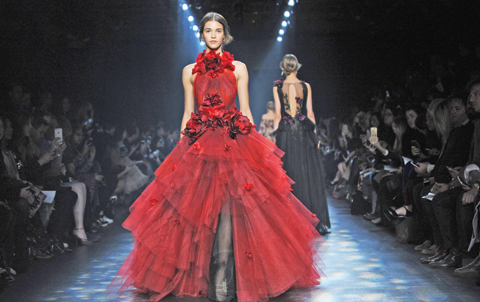
http://www.seattletimes.com/nwshowcas...
Here's the Associated Press story, "Highlights from New York Fashion Week":
"Many designers get inspiration for their fashion collections from the art world. This season Marchesa designers Georgina Chapman and Keren Craig chose the art of famed American portrait painter John Singer Sargent, who died in 1925, to inspire their always sumptuous, red-carpet ready designs. 'Each girl is going to feel like her own portrait...so we have different characters weaving through the collection...but they are all glamorous, ethereal, a Marchesa woman.'
"Specifically, the designers were aiming at capturing 'the ultra-feminine strength' of the women that Sargent painted."
Another site credits John Singer Sargent with inventing the Little Black Dress (with his startling, disturbing Portrait of Madame X):
http://www.collegefashion.net/inspira...
Like Raffi Peach, Sargent knows what it's like to be on the tail end of a trend. It's breathtaking to see his new brush with fame.
At Fashion Week in New York, Marchesa designers have unveiled a stunning new line inspired by Sargent.

http://www.seattletimes.com/nwshowcas...
Here's the Associated Press story, "Highlights from New York Fashion Week":
"Many designers get inspiration for their fashion collections from the art world. This season Marchesa designers Georgina Chapman and Keren Craig chose the art of famed American portrait painter John Singer Sargent, who died in 1925, to inspire their always sumptuous, red-carpet ready designs. 'Each girl is going to feel like her own portrait...so we have different characters weaving through the collection...but they are all glamorous, ethereal, a Marchesa woman.'
"Specifically, the designers were aiming at capturing 'the ultra-feminine strength' of the women that Sargent painted."
Another site credits John Singer Sargent with inventing the Little Black Dress (with his startling, disturbing Portrait of Madame X):
http://www.collegefashion.net/inspira...
Like Raffi Peach, Sargent knows what it's like to be on the tail end of a trend. It's breathtaking to see his new brush with fame.
Published on February 24, 2016 11:42
Divagations
Travel to Bucharest this summer in Red Hands, the story of the Romeo and Juliet of Romania.
- Colin W. Sargent's profile
- 40 followers


